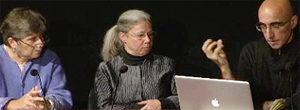| Surveillance and Citizenship | |||||
|
Thursday,
Oct. 27, 2011 Digital technologies have exponentially expanded the power of government and corporations to keep tabs on citizens. But citizens in turn are exploiting new technologies to expose the activities of governments, companies and even each other. How does the persistence and ubiquity of surveillance in our digitizing world affect what it means to be a citizen? Does our emerging condition of constant surveillance encourage individuals to curtail how they speak and act -- or to offer more information? In what ways are the new forms of citizen surveillance and public witness instruments of democracy and transparency? In what ways are they the tools of distortion and propaganda for idealogues or special interest? Our panel of three distinguished scholars will engage these and related questions on evolving notions of citizenship in the digital age. Panelists include Sandra Braman, a professor of communication at the University of Wisconsin, Milwaukee who has written extensively on information technology, law and society and author of Change of State: Information, Policy, and Power; Susan Landau, a visiting professor at Harvard University and author of Surveillance or Security? The Risks Posed by New Wiretapping Technologies recently published by The MIT Press; and Marcos Novak, professor and artist at the University of California, Santa Barbara whose work explores the relationship between humans and technology. Co-Sponsor: Technology and Culture Forum. Streaming audio of Surveillance and Citizenship is available. Downloadable Podcast A video of Surveillance and Citizenship is available. [This is an edited summary, not a verbatim transcript.] By Elyse Graham, CMS
Ethan Zuckerman set the broad terms of the discussion. New technologies are changing the ways in which citizens and governments watch each other. In the hands of governments, this power is often framed as an implicit threat: how does surveillance from above change the way we behave? Then again, we can also see new opportunities for sousveillance, observation from below—as when protesters use cell phones to film police officers. In short, being watched and participating in watching have profound implications for the way we live in a digital age.
Marcos Novak began by calling attention to the linguistic heritage, and through it the philosophical heritage, of the key words we use when talking about surveillance and the polis. Referring to the Patriot Act, he noted the word patriot, which he linked to the Iliad. He described the ancient concept of self-surveillance – connected with the idea of doing fine work for its own sake – as signifying “a pleasing thing for the gods.”
Susan Landau used three illustrative stories in her introductory comment. The first concerned East Germany in 1989. At that time, the Stasi, the East German secret police, numbered 191,000 men and women, plus informants — all told, 1 in 63 East Germans worked for the Stasi directly or indirectly. Yet despite this heavy surveillance, the East German government was unable to prevent the tumult that erupted (after early rumbles in the spring) in the summer and fall of 1989, which led ultimately to the fall of East Germany.
Sandra Braman said that new information technologies deployed for surveillance may have already dangerously changed the way in which the government and the legal system operate. Some new practices undermine some root-principles of our legal system. The new technologies have encouraged the creation of elaborate protocols intended to reveal a suspect’s intentions, not her behavior, and of computer software that aim for pre-emption instead of deterrence. There are situations, under today’s security laws and regulations, in which an individual may be convicted on the basis of digital evidence he cannot examine. Another disquieting example: if you have an “associational relationship” with someone who has become a terrorist, even if it is merely a Twitter link, some of your citizenship rights can be lost.
Landau replied that Occupy Wall Street provides a good example of a movement that can still come together under the new conditions. “We always have some people who are willing to be public early, and some who are not willing to be public early,” she said: even now, some participants and supporters have opted to remain private, while others are very much in the public eye.
|
|||||





